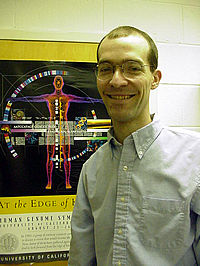Dr. Matthew Elrod-Erickson
Associate Professor | Biotechnology Admissions Coordinator

Departments / Programs
Degree Information
- PHD, Massachusetts Institute of Technology (1998)
- BS, University of Texas at Austin (1991)
Areas of Expertise
I am interested in various aspects of basic cellular and molecular biology. I am particularly interested in the molecular mechanisms that determine how proteins are sorted and transported within cells and how cytoskeletal systems help establish cell asymmetries and bring about asymmetric cell divisions. I conduct my research using the budding yeast Saccharomyces cerevisiae which is an excellent model organism for determining how basic cellular functions common to all eukaryotic cells work. Ye...
Read More »I am interested in various aspects of basic cellular and molecular biology. I am particularly interested in the molecular mechanisms that determine how proteins are sorted and transported within cells and how cytoskeletal systems help establish cell asymmetries and bring about asymmetric cell divisions. I conduct my research using the budding yeast Saccharomyces cerevisiae which is an excellent model organism for determining how basic cellular functions common to all eukaryotic cells work. Yeast are amenable to both genetic and molecular analyses, and the techniques for doing research on yeast can be mastered fairly quickly, making it an ideal system for research at the undergraduate and masters level.
Biography
Dr. Elrod-Erickson, associate professor of biology, earned his B.A. in microbiology at the University of Texas. He then furthered his education at MIT obtaining a Ph.D. in biology before taking a faculty position at MTSU
Dr. Elrod-Erickson is interested in various aspects of basic cellular and molecular biology. He is interested in the molecular mechanisms that determine how proteins are sorted and transported within cells and how cytoskeletal systems help establish cell asymmetrie...
Dr. Elrod-Erickson, associate professor of biology, earned his B.A. in microbiology at the University of Texas. He then furthered his education at MIT obtaining a Ph.D. in biology before taking a faculty position at MTSU
Dr. Elrod-Erickson is interested in various aspects of basic cellular and molecular biology. He is interested in the molecular mechanisms that determine how proteins are sorted and transported within cells and how cytoskeletal systems help establish cell asymmetries and bring about asymmetric cell divisions. He conducts research using the budding yeast Saccharomyces cerevisiae which is an excellent model organism for determining how basic cellular functions common to all eukaryotic cells work. Yeast are amenable to both genetic and molecular analyses, and the techniques for doing research on yeast can be mastered fairly quickly, making it an ideal system for research at the undergraduate and masters level.
Publications
Elrod-Erickson, M.J. and Ford, W.F. (2000). Economic implications of theHuman Genome Project. Business Economics XXXV:57-60.
Elrod-Erickson, M.J. (1998). Well worth the wait. Book Review, Trends in Cell Biology 8:336.
Elrod-Erickson, M.J. (1998). Regulation of COPII vesicle formation and protein sorting in Saccharomyces cerevisiae. Ph.D. dissertation, Massachusetts Institute of Technology.
Elrod-Erickson, M.J. and Kaiser, C. (1996). Genes that control the fidelity of endoplasmic reticulum to Golgi transport identified as suppressors of vesicle budding mutations. Molecular Biology of the Cell 7:1043-1058.
Erickson, M.J. and Meyer, R.J. (1993). The origin of greater-than-unit-length plasmids generated during bacterialconjugation. Molecular Microbiology 7: 289-298.
Barlett M. M.,Erickson M. J.,Meyer R. J.(1990) Recombination between directly repeated origins of conjugative transfer cloned in M13 bacteriophage DNA models ligation of the transferred plasmid strand. Nucleic Acids Res. 18:3579–3586.


